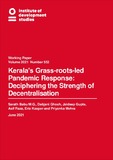| dc.contributor.author | Babu M.G., Sarath | |
| dc.contributor.author | Ghosh, Debjani | |
| dc.contributor.author | Gupte, Jaideep | |
| dc.contributor.author | Raza, Md Asif | |
| dc.contributor.author | Kasper, Eric | |
| dc.contributor.author | Mehra, Priyanka | |
| dc.coverage.spatial | India | en |
| dc.date.accessioned | 2021-06-21T08:16:43Z | |
| dc.date.available | 2021-06-21T08:16:43Z | |
| dc.date.issued | 2021-06-18 | |
| dc.identifier.citation | Babu M.G., S. et al. (2021) Kerala’s Grass-roots-led Pandemic Response: Deciphering the Strength of Decentralisation, IDS Working Paper 552, Brighton: Institute of Development Studies, DOI: 10.19088/IDS.2021.049 | en |
| dc.identifier.isbn | 978-1-78118-817-0 | |
| dc.identifier.issn | 2040-0209 | |
| dc.identifier.uri | https://opendocs.ids.ac.uk/opendocs/handle/20.500.12413/16707 | |
| dc.description.abstract | This paper presents an analysis of the role of decentralised institutions to understand the learning and challenges of the grass-roots-led pandemic response of Kerala. The study is based on interviews with experts and frontline workers to ensure the representation of all stakeholders dealing with the outbreak, from the state level to the household level, and a review of published government orders, health guidelines, and news articles. The outcome of the study shows that along with the decentralised system of governance, the strong grass-roots-level network of Accredited Social Health Activists (ASHA) workers, volunteer groups, and Kudumbashree members played a pivotal role in pandemic management in the state. The efficient functioning of local bodies in the state, experience gained from successive disasters, and the Nipah outbreak naturally aided grass-roots-level actions. The lessons others can draw from Kerala are the importance of public expenditure on health, investment for building social capital, and developing the local self-delivery system. | en |
| dc.description.sponsorship | European Union | en |
| dc.language.iso | en | en |
| dc.publisher | Institute of Development Studies | en |
| dc.relation.ispartofseries | IDS Working Paper;552 | |
| dc.rights | All rights reserved. Licensed to the European Union under conditions. Reproduction, copy, transmission, or translation of any part of this publication may be made only under the following conditions: with the prior permission of the publisher; or with a licence from the Copyright Licensing Agency Ltd., 90 Tottenham Court Road, London W1P 9HE, UK, or from another national licensing agency; or under the terms set out below. This publication is copyright, but may be reproduced by any method without fee for teaching or nonprofit purposes, but not for resale. Formal permission is required for all such uses, but normally will be granted immediately. For copying in any other circumstances, or for re-use in other publications, or for translation or adaptation, prior written permission must be obtained from the publisher and a fee may be payable. | en |
| dc.rights.uri | https://www.ids.ac.uk/files/dmfile/IDSOpenDocsStandardTermsOfUse.pdf | en |
| dc.subject | Governance | en |
| dc.subject | Health | en |
| dc.title | Kerala’s Grass-roots-led Pandemic Response: Deciphering the Strength of Decentralisation | en |
| dc.type | IDS Working Paper | en |
| dc.rights.holder | Institute of Development Studies | en |
| dc.identifier.team | Cities | en |
| dc.identifier.doi | 10.19088/IDS.2021.049 | |
| rioxxterms.funder | Default funder | en |
| rioxxterms.identifier.project | Default project | en |
| rioxxterms.version | VoR | en |
| rioxxterms.versionofrecord | 10.19088/IDS.2021.049 | en |
| rioxxterms.funder.project | 9ce4e4dc-26e9-4d78-96e9-15e4dcac0642 | en |

